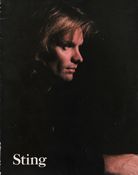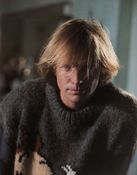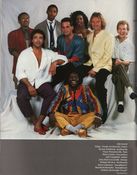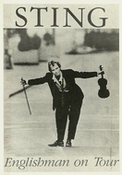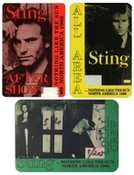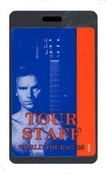
Jazz-rock blend works for Sting...
The idea of merging the streams of jazz and rock usually has been frustrated by a lack of understanding in both musical camps. But since his departure from the Police, Sting has been among the few popular rock artists to pull off this combination.
During Sting's performance Sunday night at the Marcus Amphitheater, the marriage proved to be a happy partnership between the anvil chorus of rock and the more agile artistry of jazz. Accompanied by an eight-member ensemble that included saxophonist Branford Marsalis, Sting wasn't afraid to behave like a big band leader. The spotlight frequently fell on his instrumentalists, with Sting graciously exiting centre stage to allow his audience to focus on the contributions of his collaborators.
The contributions leaned heavily on the jazz backgrounds of his band's leading lights. Listening attentively to Sting, Marsalis carefully placed and executed his alternately peppery and reflective solos.Long piano solos bordering on free jazz in selections like 'Nothing Like the Sun' tested the mettle of the melodies while letting Sting slow dance with a percussionist or roam freely the multileveled platforms of his impressively mounted stage.
Even Sting's songwriting seemed to have gained insights from working with his sidemen. The liquid harmonica of 'Consider Me Gone' a syncopated farewell to a dissolving marriage, bubbled like a ballad penned for Ella Fitzgerald. No wonder one of Sting's two keyboardists began scatting during the instrumental bridge.
But Sting also spoke a musical Esperanto, adapting the rhythms of several cultures for two long sets drawn from the Police, his first solo outing 'The Dream of the Blue Turtles' and the newer album 'Nothing Like the Sun'. A rambunctious beat shifted gears to a strident rock tempo or an easy reggae shuffle with no more complications than a car shift.
On 'Fragile', the feel was moody Latin, with a touch of flamenco from Sting's acoustic guitar.
Sting's stage presence possessed an authority grounded in his screen acting background. He highlighted his words with gestures, a bemused scratch of the head, followed by a raised professorial finger or both arms clutched against his chest for warmth.
Smiling broadly and appearing personable and outgoing, Sting established an instant rapport with his audience, most of whom remained standing enthusiastically throughout the concert.
Sting's lyrics were outstanding for their thoughtfulness and intelligence. He emphasised the theme of emotional freedom in 'Fortress Around Your Heart' and 'If You Love Somebody Set Them Free' by constructing a framework in which individual creativity sparkled.
'King of Pain' expressed another reoccurring idea in Sting's writing, his William Blake-like perception of the world as a body of interconnected parts. An outspoken advocate of Amnesty International, Sting often interjected pointed political asides into the program.
With Sting's strength as a songwriter, it was surprising that the evening's peak proved to be a cover. The Gil Evan's inspired treatment of 'Little Wing' allowed Sting's guitarist to walk in Jimi Hendrix's footsteps. He delivered a long assault, contrasted by almost meditative musings from Marsalis's corner. A powerful version bristling with unexpected turns, 'Little Wing' built to an intense and dramatic final set.
(c) The Milwaukee Journal by Dave Luhrssen
The idea of merging the streams of jazz and rock usually has been frustrated by a lack of understanding in both musical camps. But since his departure from the Police, Sting has been among the few popular rock artists to pull off this combination.
During Sting's performance Sunday night at the Marcus Amphitheater, the marriage proved to be a happy partnership between the anvil chorus of rock and the more agile artistry of jazz. Accompanied by an eight-member ensemble that included saxophonist Branford Marsalis, Sting wasn't afraid to behave like a big band leader. The spotlight frequently fell on his instrumentalists, with Sting graciously exiting centre stage to allow his audience to focus on the contributions of his collaborators.
The contributions leaned heavily on the jazz backgrounds of his band's leading lights. Listening attentively to Sting, Marsalis carefully placed and executed his alternately peppery and reflective solos.Long piano solos bordering on free jazz in selections like 'Nothing Like the Sun' tested the mettle of the melodies while letting Sting slow dance with a percussionist or roam freely the multileveled platforms of his impressively mounted stage.
Even Sting's songwriting seemed to have gained insights from working with his sidemen. The liquid harmonica of 'Consider Me Gone' a syncopated farewell to a dissolving marriage, bubbled like a ballad penned for Ella Fitzgerald. No wonder one of Sting's two keyboardists began scatting during the instrumental bridge.
But Sting also spoke a musical Esperanto, adapting the rhythms of several cultures for two long sets drawn from the Police, his first solo outing 'The Dream of the Blue Turtles' and the newer album 'Nothing Like the Sun'. A rambunctious beat shifted gears to a strident rock tempo or an easy reggae shuffle with no more complications than a car shift.
On 'Fragile', the feel was moody Latin, with a touch of flamenco from Sting's acoustic guitar.
Sting's stage presence possessed an authority grounded in his screen acting background. He highlighted his words with gestures, a bemused scratch of the head, followed by a raised professorial finger or both arms clutched against his chest for warmth.
Smiling broadly and appearing personable and outgoing, Sting established an instant rapport with his audience, most of whom remained standing enthusiastically throughout the concert.
Sting's lyrics were outstanding for their thoughtfulness and intelligence. He emphasised the theme of emotional freedom in 'Fortress Around Your Heart' and 'If You Love Somebody Set Them Free' by constructing a framework in which individual creativity sparkled.
'King of Pain' expressed another reoccurring idea in Sting's writing, his William Blake-like perception of the world as a body of interconnected parts. An outspoken advocate of Amnesty International, Sting often interjected pointed political asides into the program.
With Sting's strength as a songwriter, it was surprising that the evening's peak proved to be a cover. The Gil Evan's inspired treatment of 'Little Wing' allowed Sting's guitarist to walk in Jimi Hendrix's footsteps. He delivered a long assault, contrasted by almost meditative musings from Marsalis's corner. A powerful version bristling with unexpected turns, 'Little Wing' built to an intense and dramatic final set.
(c) The Milwaukee Journal by Dave Luhrssen


